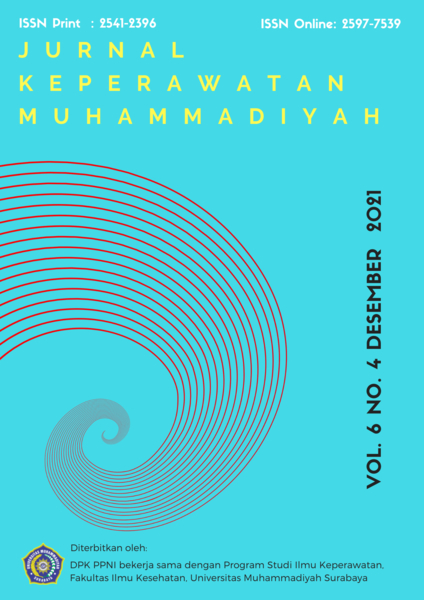Perbedaan Pengaruh Pemberian SWD Dan Mobilisasi Sendi Terhadap Peningkatan Kemampuan Fungsional Bahu
DOI:
https://doi.org/10.30651/jkm.v6i4.10304Keywords:
frozen shoulder, shoulder joint mobilization, SPADIAbstract
Objective: Frozen shoulder is a condition that often cause pain, joint stiffness, and limited of the shoulder joint, resulting in decreased functional ability for sufferers. Although the exact cause isn’t known, frozen shoulder arises due to an inflamatory reaction processes, and systemic disease disorders. The functional ability of the shoulder due to frozen shoulder using physiotherapy interventions. The pupose of this study was to determine the difference in the effect of giving Ultrasound and SWD compared to Ultrasound and mobilization of the shoulder joint in improving the functional ability of the shoulder.
Methods: This research method is Quasi-experimental. The population sample involved 14 people who were determined using the Isaac and Michael table. There was divide into a control group and an experimental group, which consisted of 7 people. The control group was given Ultrasound and SWD, while the experimental group was given Ultrasound and mobilization of the shoulder joint. The data is collected using the SPADI questionnaire. The collected data were tested for normality using the Shapiro Wilk method and analyzed using the independent t-test.
Results: There are differences in the effect of giving Ultrasound and SWD compared to Ultrasound and mobilization of the shoulder joint in improving the functional ability of the shoulder with a significant value of < 0.001
Conclusion: The proves that the Ultrasound and mobilization of the shoulder joint are more influential in improving the functional ability of the frozen shoulder.References
Anggiat, L. (2020). Terapi Manual Mobilisasi Sendi (R. Elizabeth & A. Gunawan (eds.); 1st ed.). UKI Press.
Anggiat, L., Altavas, A. J., & Budhyanti, W. (2020). Joint Mobilization: Theory and evidence review. International Journal of Sport, Exercise and Health Research, 4(2), 86–90.
Cahya, B. T. (2016). Penatalaksanaan Fisioterapi Pada Kasus Frozen Shoulder Dextra E.C Capsulitis Adesiva Dengan Modalitas Infra Red (IR) Dan Terapi Manipulasi Di RS. Aisyiyah Ponorogo. 66, 37–39.
Cavalleri, E., Servadio, A., Berardi, A., Tofani, M., & Galeoto, G. (2020). The effectiveness of physiotherapy in idiopathic or primary frozen shoulder: A systematic review and meta-analysis. Muscles, Ligaments and Tendons Journal, 10(1), 24–39. https://doi.org/10.32098/MLTJ.01.2020.04
Chan, H. B. Y., Pua, P. Y., & How, C. H. (2017). Physical therapy in the management of frozen shoulder. Singapore Medical Journal, 58(12), 685. https://doi.org/10.11622/SMEDJ.2017107
Ebrahimzadeh, M. H., & Moradi, A. (2019). The Relationship between Depression or Anxiety Symptoms and Objective and Subjective Symptoms of Patients with Frozen Shoulder. International Journal of Preventive Medicine, 10(1), 38. https://doi.org/10.4103/IJPVM.IJPVM_212_17
Hammad, S., Arsh, A., Iqbal, M., Khan, W., Bilal, B., & Shah, A. (2019). Comparing the Effectiveness of Kaltenborn Mobilization with Thermotherapy versus Kaltenborn Mobilization Alone In Patients With Frozen Shoulder (adhesive capsulitis); A Randomized Control Trial. Journal of the Pakistan Medical Association, 0, 1. https://doi.org/10.5455/JPMA.279
Hayes, K. W., & Hall, K. D. (2016). Agen Modalitas (N. A. I. Ghani (ed.); 6th ed.). EGC.
Kisner, C., & Colby, L. A. (2016). Terapi Latihan Vol 2 (N. A. I. Ghani (ed.); 6th ed.). EGC.
Linaker, C. H., & Walker-Bone, K. (2015). Shoulder disorders and occupation. Best Practice & Research Clinical Rheumatology, 29(3), 405–423. https://doi.org/10.1016/J.BERH.2015.04.001
Marcon, R. M., Cristante, A. F., Teixeira, W. J., Narasaki, D. K., Oliveira, R. P., & Pessoa de Barros Filho, T. E. (2013). Fractures of the cervical spine. Clinics, 68(11), 1455–1461. https://doi.org/10.6061/clinics/2013(11)12
Mezian, K., Coffey, R., & Chang, K.-V. (2021). Frozen Shoulder. StatPearls. https://www.ncbi.nlm.nih.gov/books/NBK482162/
Ombregt. (2013). Applied anatomy of the shoulder. A System of Orthopaedic Medicine, e39–e51. https://doi.org/10.1016/B978-0-7020-3145-8.00063-6
Page, M. J., Green, S., Kramer, S., Johnston, R. V., Mcbain, B., & Buchbinder, R. (2014). Electrotherapy modalities for adhesive capsulitis (frozen shoulder). Cochrane Database of Systematic Reviews, 2014(10). https://doi.org/10.1002/14651858.CD011324
Page, P., Frank, C. C., & Lardner, R. (2019). Pemeriksaan & Pengobatan pada Ketidakseimbangan Otot The Janda Approach (Sudaryanto (ed.)). EGC.
Purnomo, D., Abidin, Z., Puspitasari, N., Fisioterapi, A., & Husada, W. (2017). Pengaruh Short Wave Diathermy (SWD) dan Terapi Latihan terhadap Frozen Shoulder Dextra. Jurnal Fisioterapi Dan Rehabilitasi (JFR), 1(1).
Sudaryanto, S., & Nashrah, O. N. (2020). Efektivitas Kombinasi Ultrasound Dan Maitland Mobilisation Atau Kaltenborn terhadap Perubahan Nyeri Dan Range Of Mobilisation Pada Penderita Frozen Shoulder Di RSAD TK. II Makassar. Media Kesehatan Politeknik Kesehatan Makassar, 15(1), 18–30. https://doi.org/10.32382/MEDKES.V15I1.1333
Tonino, P. (2016, June). Frozen Shoulder Symptom. Spoerts Health. https://www.sports-health.com/sports-injuries/shoulder-injuries/frozen-shoulder-symptoms
V Ryan, H Brown, CJ Minns Lowe, J. L. (2016). The pathophysiology associated with primary (idiopathic) frozen shoulder: a systematic review. BMC Musculoskelet Disord, 17(1), 340. https://doi.org/10.1186/s12891-016-1190-9
Watson, T. (2015). Herapeutic ltrasound. 2012, 1–18.
Downloads
Published
Issue
Section
License
- Penulis tetap memegang hak atas karyanya dan memberikan hak publikasi pertama kepada jurnal ini yang secara simultan karya tersebut dilisensikan di bawah:Â Creative Commons Attribution-ShareAlike 4.0 International (CC BY-SA 4.0)













